Energy-bereft world in darkness
Sanctions against Russian energy, high cost fuel, heat waves and droughts all at once have raised the price of daily energy use to unprecedented levels and plunged large parts of the world into darkness.
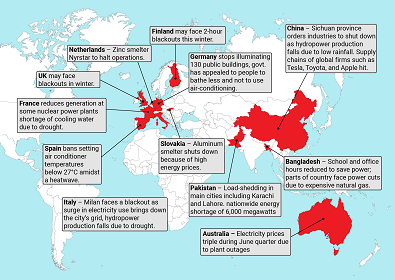 Courtesy: Getty Images
Courtesy: Getty Images
Sanctions against Russian energy, high cost fuel, heat waves and droughts all at once have raised the price of daily energy use to unprecedented levels and plunged large parts of the world into darkness.
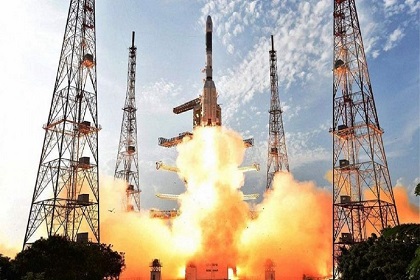 Courtesy: ISRO
Courtesy: ISRO
The Quad has agreed to launch a satellite-based maritime security initiative to curb illegal fishing by China. India is a global leader in satellite launches, especially in Earth Observation (EO) satellites. The Indo-Pacific nations are looking at the Indian model because it is applicable, economical, and sustainable.
 Courtesy: BNP Paribas
Courtesy: BNP Paribas
The Anglo-French commercial treaty of 1860 opened trade between France and Bombay, and brought two iconic French companies – a shipping line and the city’s first European bank. Bombay’s affluent residents were already familiar with French fashion, luxury goods, wines and liqueurs.
 Courtesy: TDB
Courtesy: TDB
Financial intermediaries are critical lubricants for business, growth and development. The Indo-Pacific countries are industrializing, but smaller nations lag behind economically. The Quad countries can aid the advancement of the financial architecture in the Indo-Pacific by helping to develop an ecosystem, modelled on the examples of Japan and India.
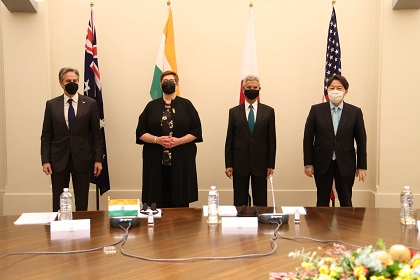 Courtesy: Ministry Of External Affairs
Courtesy: Ministry Of External Affairs
The Quad Foreign Ministers’ Meeting, held in Melbourne on February 11, revealed an ambitious plan for economic and developmental affairs, beyond the security concerns posed by China. Despite differing approaches towards Myanmar and Ukraine, the Quad countries are strengthening their cooperation while maintaining strategic autonomy.
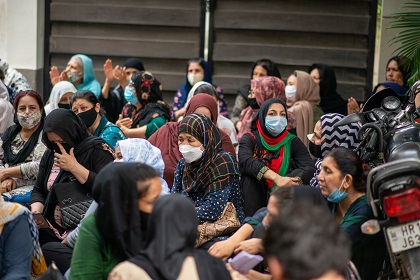 Courtesy: Shutterstock
Courtesy: Shutterstock
India has seen a recent influx of refugees from Afghanistan and Myanmar. This has highlighted the absence of a concrete refugee policy in India. India must formalise its approach towards refugees. The Citizen Amendment Act of 2019, is a start. India can move this forward by learning from the examples of other democracies like the U.S., Kenya and South Korea, on how to balance international law with its national security interests.
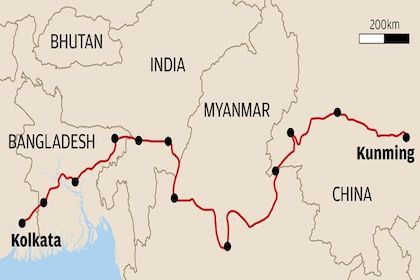 Courtesy: Institute of Peace and Conflict Studies
Courtesy: Institute of Peace and Conflict Studies
China is a clear winner in the physical connectivity stakes in the Bay of Bengal, and there's a reason a why: Its projects are connected to one another, from rail to road to port. While India also has some successful cross-border road and rail infrastructure projects, they are often an extension of an existing railway line or highway, not specific to the connectivity needs of the region. India can win by focussing instead on building infrastructure to maximise the vast maritime potential of the Bay of Bengal, especially the Andaman and Nicobar Islands that give India access to critical sea channels and trade routes.
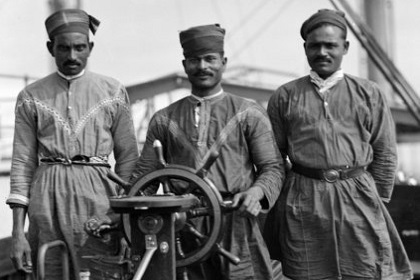 Courtesy: Wikimedia Commons
Courtesy: Wikimedia Commons
The early roots of the Indian diaspora in the UK are not about the storied success of the Hinduja brothers or celebrated economist Lord Meghnad Desai. Rather it lies in Indian sailors – the lascars – and the soldiers – faujis – of the World Wars, and the many hardworking labourers attracted to jobs in post-war Britain. These are very much the profile of most irregular Indian migrants in the UK today, many of them Sikh youth.
 Courtesy: Twitter | @DrSJaishankar
Courtesy: Twitter | @DrSJaishankar
UK Prime Minister Boris Johnson is in India, seeking a trade deal, and promising immigrant visas. The UK wants more Rishi Sunaks but the simmering issue is about irregular migrants from India, low-skilled labour whose numbers are still disputed by both countries. While a free trade agreement may still be signed, it will likely not address this problem, leaving thousands of Indians undocumented in the UK.
 Courtesy: Shutterstock
Courtesy: Shutterstock
The UN turned 75 this year but instead of grand celebrations, the world witnessed an empty UNGA with world leaders addressing it via video screening because of the pandemic. The UN is under unprecedented stress and being shown up for its inability to tackle the challenges of today like the pandemics, climate change, terrorism or global peace and security. The institution's key governing structures, especially the UN Security Council, are inadequate and demand reform. India must now use gritty resolve to ensure its place in these governing structures.